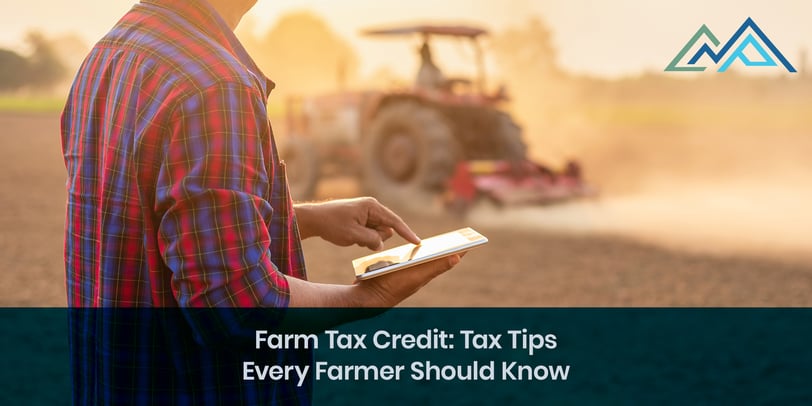This post was originally published July 16, 2019, and extensively updated April 22, 2021
If you raise crops or livestock for profit, and the money you make is your primary source of income, then the Internal Revenue Service considers your farm to be a business.
At CMP, our farming clients are sometimes unclear about which business taxes they must pay. If you are unsure about your tax obligations, you may run into problems with the Internal Revenue Service and your state and local tax agencies.
This guide has been put together to help you understand what your tax obligation is as a farmer.

Do Farmers Pay Taxes?
Every tax year, we receive questions from farmers about what taxes farmers need to pay. Farmers are business owners if they grow crops and raise livestock to sell. As business owners, tax law in the United States requires that they pay taxes on behalf of their businesses and their employees.
Some exceptions apply to farmers' taxable income and may help to reduce the tax burden of farmers. In this post, we'll cover the various tax types that apply to farm businesses and give you tips and resources to help reduce your tax liability now and in the future.
Taxes Farmers Must Pay
Several tax types may be your responsibility if you are a farmer, so this section reveals the various taxes that may apply to you.
Tax on Business Income
The first business tax that you need to pay as a farmer is a tax on business income tax. Farm income will be reported on your personal income tax return and the tax assessed there.
The most common sources of farming business income are the sales of livestock, produce and grains, and other products raised or bought for resale.
Items paid for in cash must also be reported. You must track the money you receive and your expenses paid.
As a farmer, you may sell produce and other products at farmers’ markets. Even though many of the sales may be cash transactions, this money is considered farm income and must be reported to the IRS.
If you barter for goods or allow someone to work in exchange for items you produce then you must report that as income. Other income sources that must be reported on Schedule F include:
- Agricultural program payments
- Commodity Credit Corporation (CCC) loans
- Cooperative distributions
- Crop insurance proceeds
- Custom hire (machine work) income
- Federal crop disaster payments
Employment Taxes
If you hire workers to plant and harvest crops, care for livestock, and do other work on behalf of your farming business, and you will need to pay employment tax.
Federal employment taxes fall into three categories:
- Income tax withholdings
- Social Security tax and Medicare tax
- Federal unemployment tax (possibly)
Your employment tax obligations require you to:
- Withhold federal and state income tax from the wages you pay your employees. Your employees should fill out a W-4 form to let you know what to withhold.
- Withhold local income tax if applicable.
- Withhold Federal Insurance Contributions Act (FICA) tax, aka Social Security and Medicare taxes.
- Pay a share of FICA taxes that’s equal to what your workers pay. (There is an employee obligation and an employer obligation. You must withhold the former from your employees’ paychecks, report it, and pay it to the IRS. You must report and pay the latter.)
- Special rules apply to farms in regard to FUTA and SUTA. In general, if you pay wages less than 20k a quarter. You don’t need to report or pay FUTA or SUTA. Check with your CPA or employment office to know your state limits.
If you pay your children to work for you, you can deduct the wages you pay. They have an exemption that allows them to receive their full wage without paying FICA taxes on it.
You are not required to pay employment tax on non-cash wages like room and board.
If you contract with a crew boss who provides labor for your farm as an independent contractor, you are not required to pay employment tax for the boss or their employees. That is their responsibility.
Sales Tax
Most states have a state sales tax. Some farming income is exempt from sales tax. The following transactions qualify for the sales and use tax exemption in Utah.
- Tangible personal property used in farming operations, if feed, medicine, or veterinary supplies are used: to feed or care for working animals or marketed animals, to produce or care for agricultural products you sell, or to care for fur-bearing animals kept for breeding or production of sellable products.
- Seasonal crops, seedlings, garden, farm, or agricultural produce sold in the harvest season.
- Sales by vendors are liable for sales tax unless the vendor has a sales tax exemption.
Poultry, eggs, and dairy products are not considered seasonal products and are not exempt. Effective on April 1, 2019, the Utah sales tax increased from 4.7% to 4.85% due to Proposition 3.
Property Tax
Business farm property is subject to a property tax in Utah. Property tax rates are determined by the Utah County Assessor's office based on the land's value and use. Under Utah state tax law, the property includes:
- Real property, including residential and commercial buildings, agricultural land, and vacant land.
- Personal property used to operate a business, including leased/rented equipment, furniture, shelves, and other items.
You must account for property tax when planning for your farm expenses. You can find additional information about the property assessment process here.
Use Taxes
The Utah Use Tax applies only when the sales tax does not apply. Use Tax is defined as:
A tax on goods and taxable services purchased for use, storage, or other consumption in Utah during the taxable year and applies only if sales tax was not paid at the time of purchase.
The most common situation where the Use Tax would apply would be if you purchase equipment or supplies from an out-of-state seller who didn't collect a sales tax. The Use Tax in Utah is determined on the county level and, as of 2020, ranges from .0610 to .0735 depending on where your farm is. The full rate table is here.
Excise Taxes
The Excise Tax is like a sales tax in that it's applied at the point of sale and passed to the consumer. It applies only to certain goods, including fuel & gasoline, cigarettes, and alcohol. The Excise Tax is sometimes calculated based on units sold rather than the amount paid.
Farmers in Utah are exempt from the Excise Tax on gasoline if it's used for business purposes. You will pay the Excise Tax when you purchase fuel for your farm, but you can take a deduction on your income tax return. Find additional information about fuel tax rates in Utah here.
Gift Taxes
If you transfer property to someone else during the year, you may need to file a Gift Tax return. This applies to donors while they are living. The IRS says that a gift is the "transfer of property by one individual to another while receiving nothing, or less than full value, in return." If you sold something to a relative at a steeply discounted price, you might be required to file a Gift Tax return.
Gifts that you give to your spouse are exempt from the Gift Tax. For 2022, you may gift up to $16,000 without paying the Gift Tax. Get additional information in the Frequently Asked Questions About Gift Tax IRS publication.
Self-Employment Taxes
Being self-employed means you will also need to pay the Self-Employment Tax. You are required to pay both the employer’s and the employee’s share. It is important to properly structure your business to reduce this tax if possible.
Self-Employment Tax is calculated based on your income after expenses. You are able to deduct farm expenses to reduce your tax liability. You are also able to deduct business losses.
The nature of farming is such that farmers may experience extended periods where they earn little or no income. In that case, you may use the Farm Optional method to pay some Self-Employment Tax. You would do this to further qualify for social security benefits.
Deadline for Farmers to File Income Tax
Filing your income tax return is a requirement if you earn money from your farm. There are two key dates you'll need to know about.
The first is January 15 each year, which is the date when you must pay your estimated federal income tax to the IRS if you are making quarterly payments. The second is March 1, which is the date to file your income tax return and pay your tax if you didn’t make estimated payments, to be exempt from penalties.
The filing deadline in Utah is April 15th if you pay taxes for your farm on a calendar year basis. If you operate on a fiscal year basis, you must pay by the 15th day of the 4th month after the fiscal year ends. You can find additional information on the Utah state website, here.
How to File Farm Taxes
Every farmer needs to understand the basics of tax law and their obligations to report taxable income. There are resources available to help.
For more information, check the following resources:
- IRS guidelines for Reporting Farm Income and Expenses.
- 10 Helpful Tips for Farm Tax Returns
- Information about Schedule F to report farm profits or losses
It is a good idea to engage a tax professional to assist you in understanding tax cuts, tax deductions, and tax obligations.
Farm Tax Deductions
One of the biggest tax mistakes that farmers make is not capturing all of their deductions. You should be deducting all eligible business expenses, including the purchase of seeds, livestock, fuel, and farming equipment. You are able to deduct wages paid to your children.
Big items like machinery and livestock will need to be depreciated over time. You should write off expenses to reduce your tax liability. Learn more in our post about farm tax credits and deductions.
Grow Your Farm Business with the Help of an Accountant
As the owner of a farming business, it is your responsibility to understand your tax obligations. The way you file can have a significant impact on current and future business decisions, including an expansion of your farm, family succession, and more.
Do you need help figuring out how to file and pay your farming taxes? Contact us today to learn more about CMP's accounting and tax services for farming and ranching businesses.

















